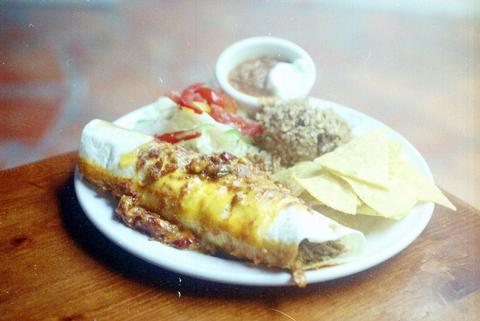For Taipei's foreign population, Grandma Nitti's Kitchen is one of the few places to find food that reminds them of home.
Contrary to popular musings, there was neither a grandma nor someone named Nitti in its kitchen, only Rainbow Lin (林虹慧), the founder and owner of the restaurant. With strong interest in cooking and encouragement from her American friends, Lin started a humble five-table eatery, where she doubled as its chef, near National Taiwan University 14 years ago to cater to the needs of homesick foreigners in Taipei. That was before the deluge of customers forced Grandma to expand to a three-story building in an alley off Shita Rd.

PHOTO: DAVID VAN DER VEEN, TAIPEI TIMES
Although targeting Western appetites, Lin never promises to provide the "authentic" flavor. "The name of the restaurant tries to tell people that we offer dishes that taste like their mother's cooking in a home environment. We wouldn't brag that what we offer is 100 percent authentic, because every mother cooks in her own way," Lin said.
Starting with only 10 simple items like omelets and sandwiches, Grandma's heavy-volume menu is the result of years of trials on Lin's many foreign friends to make sure that the items satisfy Western tastes.
Grandma prides itself on breakfast items, which helped it establish its popularity in its early years.
The vegetarian Greek veggie and feta cheese omelet (NT$250) is a must-try even for non-vegetarians. The omelet's rich filling of vegetables and cheese flows out at the slit of the knife.
Later this month, several new items will be added to the menu, including the veal with red wine sauce and sauteed mushroom (NT$350) and chicken tequila fettuccine (NT$350). The latter combines pasta with lightly cooked chicken and sweet peppers, creating a delightful color scheme. The otherwise bland dish is prepared with tequila to give it an unique aroma.
The menu also includes a mix-and-match section of lunch items so that for between NT$150 and NT$200, diners can pick a combination from the list of fillings like chili beef patty and Tex-Mex veggie and breads like pita and focaccia.
Refillable coffee and tea (NT$100) is an important attraction for many of Grandma Nitti's customers. On weekends, groups of friends can be seen whiling away the afternoon drinking coffee and chatting in its laid-back environment.
For food of the mind, Grandma hosts a second-hand English-language store that is open every Sunday afternoon.
Being a popular meeting point between foreigners in Taipei, Grandma has a useful whiteboard at its front door for people to post housing or language-learning information.

In the March 9 edition of the Taipei Times a piece by Ninon Godefroy ran with the headine “The quiet, gentle rhythm of Taiwan.” It started with the line “Taiwan is a small, humble place. There is no Eiffel Tower, no pyramids — no singular attraction that draws the world’s attention.” I laughed out loud at that. This was out of no disrespect for the author or the piece, which made some interesting analogies and good points about how both Din Tai Fung’s and Taiwan Semiconductor Manufacturing Co’s (TSMC, 台積電) meticulous attention to detail and quality are not quite up to

April 21 to April 27 Hsieh Er’s (謝娥) political fortunes were rising fast after she got out of jail and joined the Chinese Nationalist Party (KMT) in December 1945. Not only did she hold key positions in various committees, she was elected the only woman on the Taipei City Council and headed to Nanjing in 1946 as the sole Taiwanese female representative to the National Constituent Assembly. With the support of first lady Soong May-ling (宋美齡), she started the Taipei Women’s Association and Taiwan Provincial Women’s Association, where she

It is one of the more remarkable facts of Taiwan history that it was never occupied or claimed by any of the numerous kingdoms of southern China — Han or otherwise — that lay just across the water from it. None of their brilliant ministers ever discovered that Taiwan was a “core interest” of the state whose annexation was “inevitable.” As Paul Kua notes in an excellent monograph laying out how the Portuguese gave Taiwan the name “Formosa,” the first Europeans to express an interest in occupying Taiwan were the Spanish. Tonio Andrade in his seminal work, How Taiwan Became Chinese,

Mongolian influencer Anudari Daarya looks effortlessly glamorous and carefree in her social media posts — but the classically trained pianist’s road to acceptance as a transgender artist has been anything but easy. She is one of a growing number of Mongolian LGBTQ youth challenging stereotypes and fighting for acceptance through media representation in the socially conservative country. LGBTQ Mongolians often hide their identities from their employers and colleagues for fear of discrimination, with a survey by the non-profit LGBT Centre Mongolia showing that only 20 percent of people felt comfortable coming out at work. Daarya, 25, said she has faced discrimination since she